Gleeful Spanish locals are rejoicing after seeing a drop in the number of Costa Del Sol holidaymakers following years of angry anti-tourism demonstrations.
The holiday hotspot has recorded its first decline in visitors since the Covid-19 pandemic – with typically bustling destinations seemingly becoming far less-crowded.
Images from Benidorm taken in the last few days show empty chairs outside bars and restaurants – rare for this time of year when they are usually rammed with tourists.
The pictures follow mass protests across Spain where thousands have claimed excessive tourism is forcing locals out of affordable housing, raising the cost of living and making the city centres unusable.
Majorca has also seen a sharp decline in tourist numbers, with officials claiming that a relentless campaign of anti-tourist protests is ‘scaring away visitors’ as locals say some resorts are now ‘completely dead’.
In Costa del Sol, the holiday rental sector saw a drop of 2.2% in tourist numbers during the first half of the year – a trend that has accelerated since March, when numbers hit a low of 57%, according to local paper Sur In English.
While the downturn has sparked concern among some local businesses, others see it as a welcome break after years of over tourism and have taken to social media to share their relief.
One person wrote: ‘The news is painted as bad but the reality is that it’s good. Tourism is fine but the tourist mass coming to Malaga was more than the city could handle. I’d rather take care of 10 tourists well than 100 bad.’
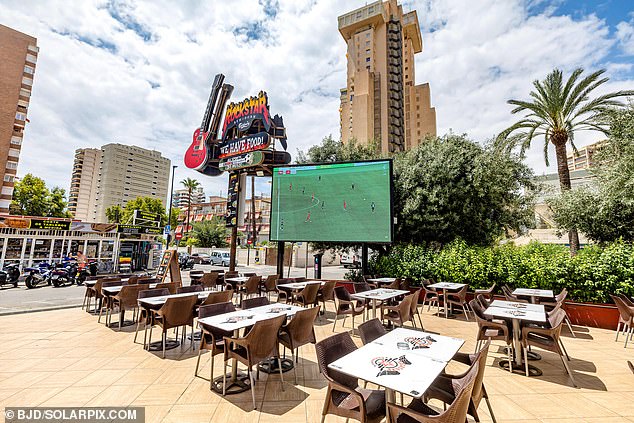
Gleeful Spanish locals are rejoicing after seeing a drop in the number of Costa Del Sol holidaymakers following years of angry anti-tourism demonstrations. Pictured: An empty bar a few days ago
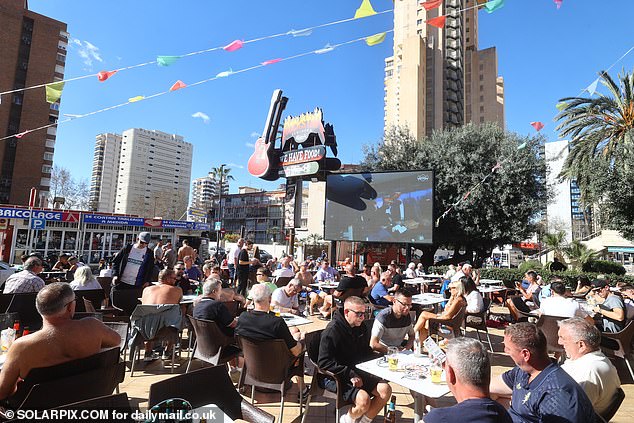
An image taken of the same bar sharply contrasts with scenes in March this year (pictured) when the same terrace was rammed with drinkers
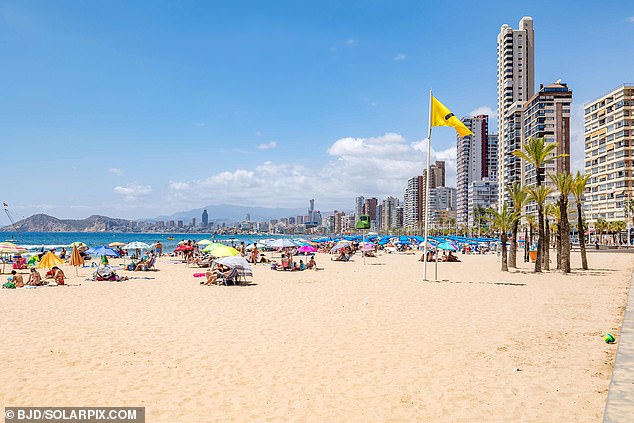
Pictured: Benidorm with unusually quiet bar terraces and some space on the local beaches
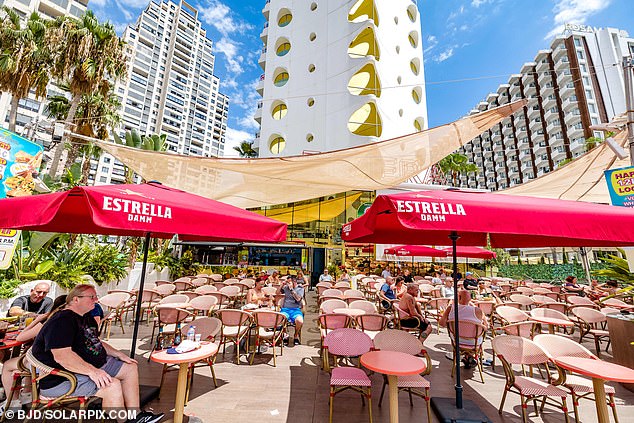
Images from Benidorm show empty chairs outside bars and space on beaches – rare for this time of year when they are usually rammed with tourists
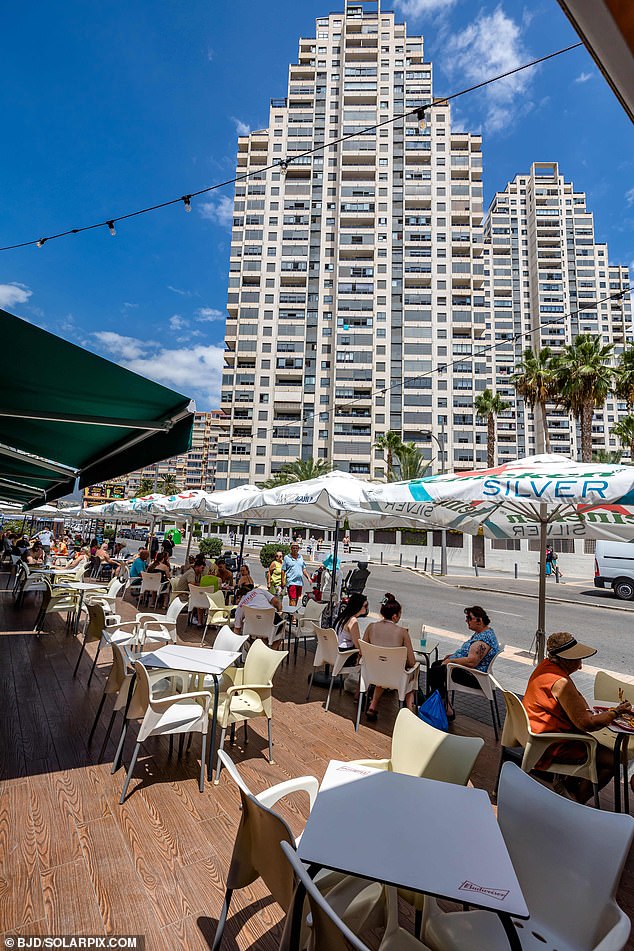
In Costa del Sol, the holiday rental sector saw a drop of 2.2% in tourist numbers during the first half of the year – a trend that has accelerated since March, when numbers hit a low of 57%. Pictured: A bar in Benidorm with empty tables

While the downturn has sparked concern among local businesses, others see it as a welcome break after years of struggling to cope with overtourism
Another added: ‘Very good news, let’s see if we stop depending on tourism and the business fabric returns to Spain.
‘Tourism should be regulated somehow and see if the real estate bubble explodes because of that and people here can buy a house again like it used to be.’
A third said: ‘It seems good to me, that it goes down, even if it negative impact on commerce (and I feel sorry for those freelancers) but if we settle in that niche we will never be able to improve the rent of the Malagasy, added to that the price of the property would continue to rise.
‘We don’t want displaced Malagasy people, we want Malagasy people thriving. Tourism is not bad, but Malaga needs to grow according to its situation, and what was happening is that we were above what we could stand.
‘Let’s see if this helps entrepreneurs to rethink if the only business that thrives in Malaga is the quaternary sector… We want more industry, which can really make Malagasy people increase their capital!!!’
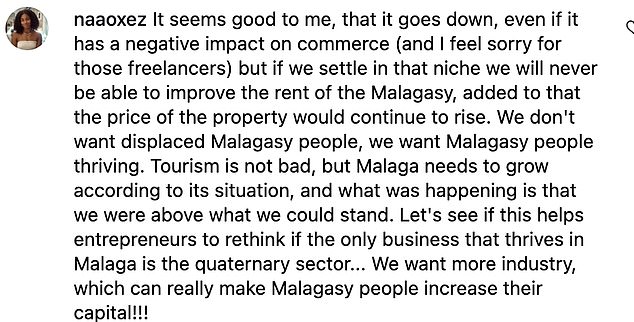

Pictured: Locals express their feelings about the decline in tourists
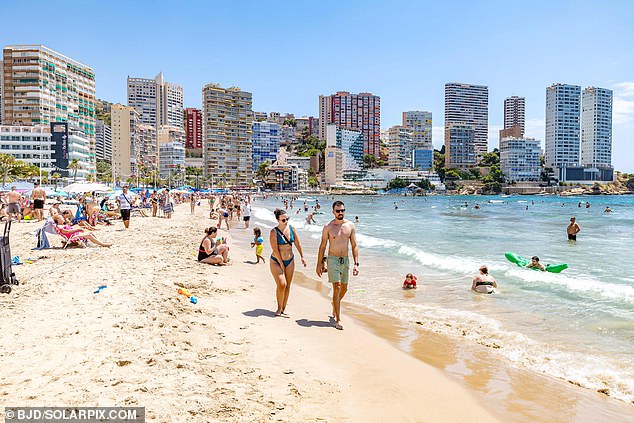
It follows mass protests across Spain where thousands have claimed excessive tourism is forcing locals out of affordable housing, raising the cost of living and making the city centres unusable. Pictured: A beach in Benidorm
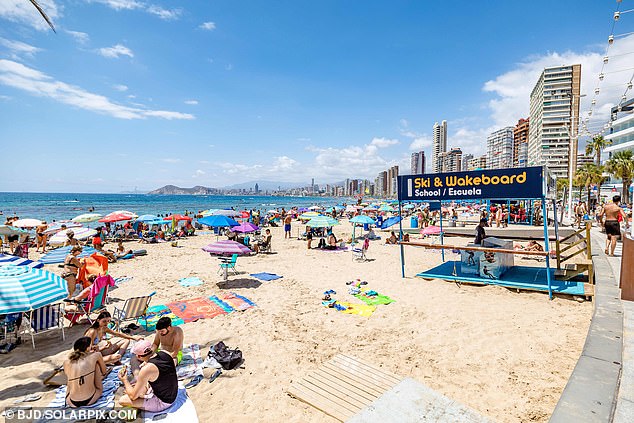
The decline in tourist numbers is thought to be caused by a combination of rising prices, overtourism concerns, and a shift in travel preferences
The decline in tourist numbers is thought to be caused by a combination of rising prices, overtourism concerns, and a shift in travel preferences.
It comes as a slump in spending in Majorca this summer has been blamed on the wave of anti-tourism protests that have gripped Spain.
With British holidaymakers seemingly among foreigners turning their backs on the island, its tourism industry is in panic mode as officials overseeing the nightlife sector and tour companies warn that guests no longer feel ‘welcomed’.
The restaurant association president, Juanmi Ferrer, gave a stark warning that the messaging of the protests is ‘scaring visitors away’.
Additionally, Miguel Pérez-Marsá, head of the nightlife association, told Majorca Daily Bulletin: ‘The tourists we’re interested in are being driven away; they don’t feel welcome and are going to other destinations.’
Local media reports that the situation has become so dire that some managers have given staff holidays in the middle of July, which is often the height of the summer rush.
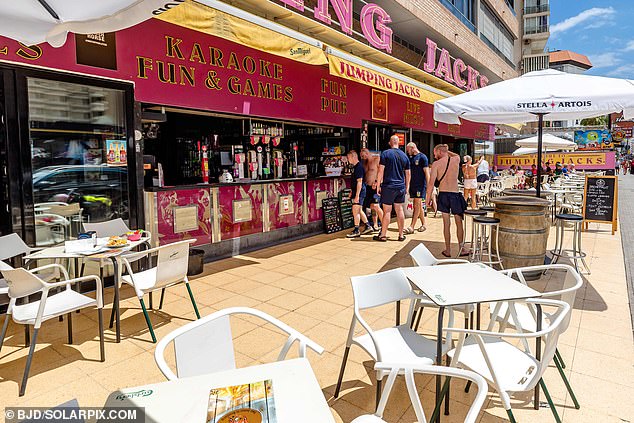
Costa del Sol isn’t the only Spanish holiday hotspot experiencing a drop in visitors this year – Majorca has also seen a sharp decline in tourist numbers. Pictured: Jumping Jacks bar a few days ago
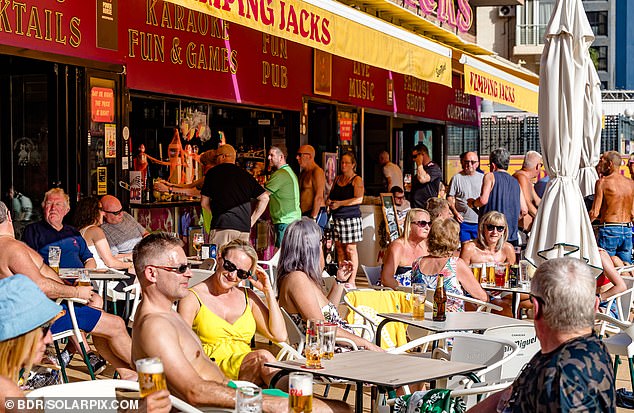
This is the same bar pictured last year, before the decline in tourist numbers
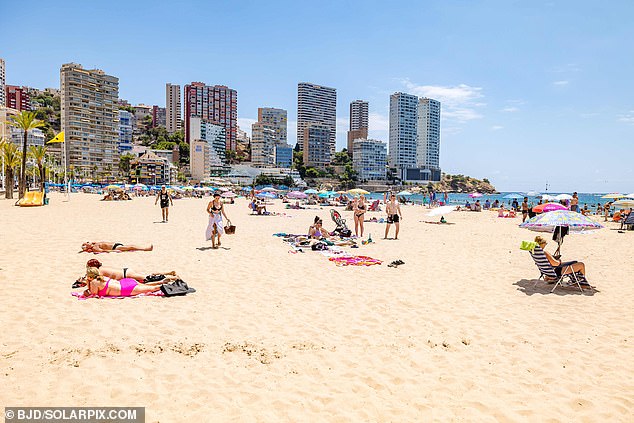
Pictured: A beach in Benidorm unusually quiet for this time of year
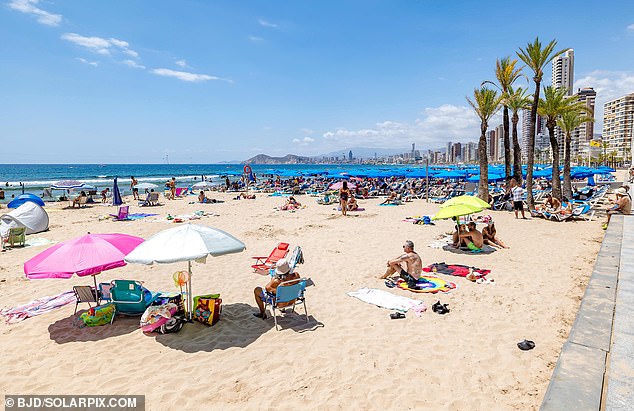
This time of year beaches in Benidorm are expected to be rammed with tourists at this time of year but images suggest otherwise
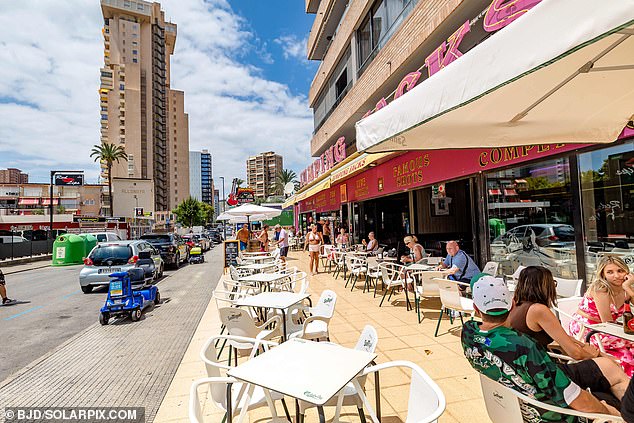
Streets are also far quieter than usual in the Spanish municipality
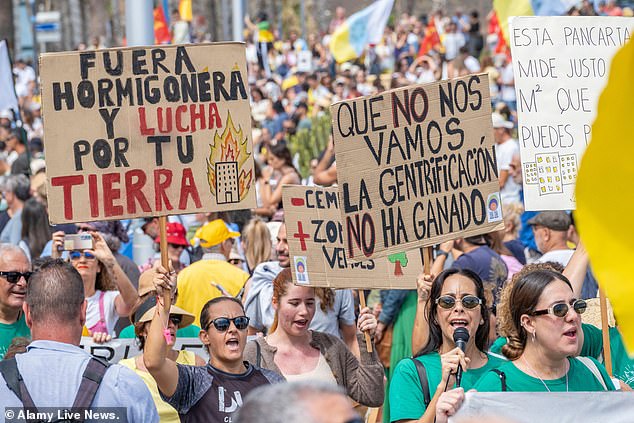
Costa del Sol isn’t the only Spanish holiday hotspot experiencing a drop in visitors this year – Majorca has also seen a sharp decline in tourist numbers. Spanish officials have admitted that a relentless campaign of anti-tourist protests in Majorca is ‘scaring away visitors’ – with locals claiming some resorts are now ‘completely dead’
But it’s not just bars, restaurants, and nightlife venues feeling the slump.
Tour guides are seeing the same downward trend. Pedro Oliver, president of the College of Tour Guides, said: ‘The anti-tourism messages are resonating.’
He revealed excursion sales have dropped by 20 per cent this summer, with Valldemossa, Palma and Port Soller among the worst-hit areas as British, German, and Italian tourists have all been put off.
‘If you generate negative news, which has repercussions in other countries, tourists opt for other destinations when choosing their holidays,’ he said. ‘We are sending the message that we don’t want tourists and that everything is too crowded.’
Excursion operator Proguies Turístics normally offers around 30 excursions per cruise. That number is now down to just 12 to 14.
Its president, Biel Rosales, warned: ‘Tourismphobia and the idea that tourists are not welcome are hurting us greatly.’ He added that high prices and traffic jams are also turning tourists away.
Transport bosses are also worried. Rafel Roig, president of the transport federation, said: ‘You can’t send out these messages because people won’t go where they’re not wanted.’
Coach firms and taxi drivers have both seen a decline in customers.
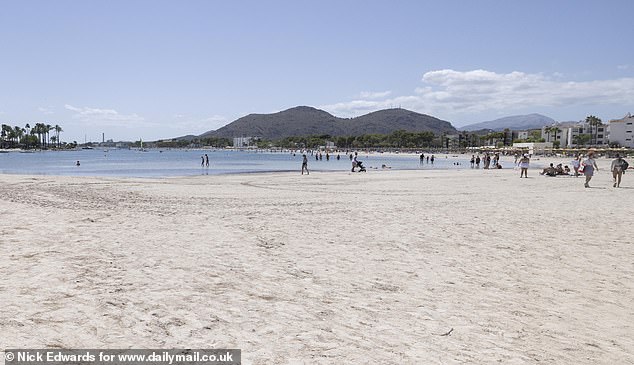
Majorca’s beaches, often filled with tourists has seen fewer people than usual
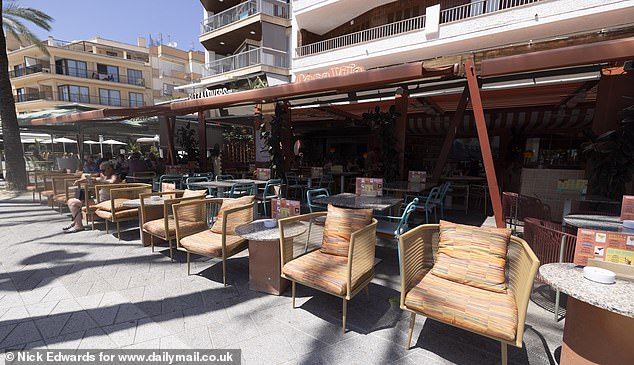
Pictured: Empty chairs outside a restaurant in Majorca a few days ago
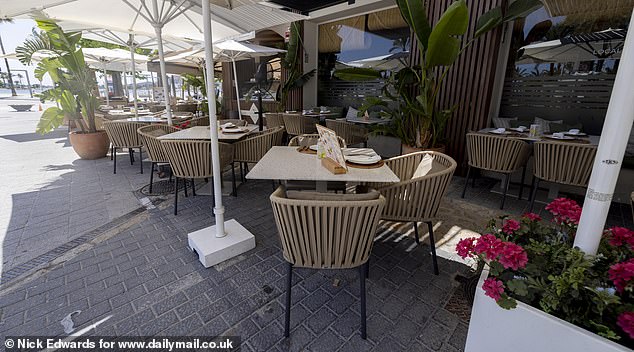
A recent image shows another empty restaurant in Majorca
Biel Moragues, from one of the island’s taxi associations, said: ‘British tourists are the most upset by the protests and have changed their holiday destination.’
Locals now say tourism on the island is completely different from years gone by.
It comes after anti-tourism activists have wreaked havoc across Spain this summer.
Thousands of protestors marched through central Barcelona last month, waving placards and squirting holidaymakers with water guns in the latest expression of anger at perceived overtourism in Spain.
Under the slogan ‘Enough! Let’s put limits on tourism’, some 2,800 people – according to police – marched along a waterfront district of Barcelona to demand a new economic model that would reduce the millions of tourists that visit every year.
Protesters carried signs reading ‘Barcelona is not for sale,’ and, ‘Tourists go home,’ before some used water guns on tourists eating outdoors at restaurants in popular tourist hotspots. Chants of ‘Tourists out of our neighbourhood’ rang out as some stopped in front of the entrances to hotels.
Barcelona’s rising cost of housing, up 68 percent in the past decade, is one of the main issues for the movement, along with the effects of tourism on local commerce and working conditions in the city of 1.6 million inhabitants.
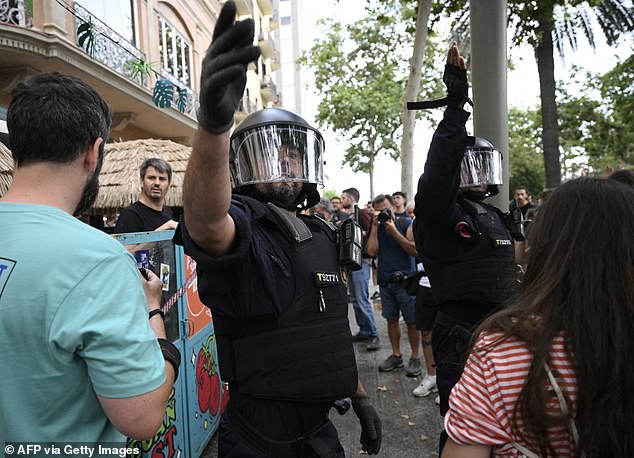
Anti-riot forces gesture as protestors marched through Barcelona’s Las Ramblas alley, on July 6
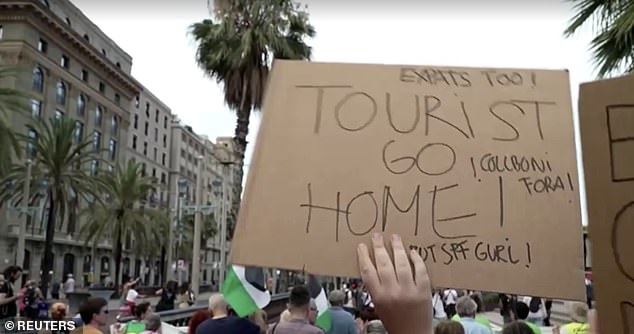
Video showed protestors gathering in Las Ramblas, a hotspot for holidaymakers
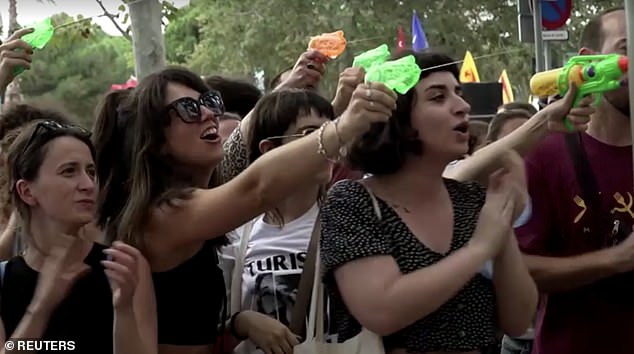
Protestors squirted water guns at tourists eating in popular spots in the city
Rents rose by 18% in June from a year earlier in tourist cities such as Barcelona and Madrid, according to the property website Idealista.
For years, the city has worn anti-tourist graffiti with messages such as ‘tourists go home’ aimed at visitors some blame for the rising prices and shaping of the economy around tourists.
The Barcelona protests came after similar demonstrations in tourist hotspots such as Malaga, Palma de Mallorca and the Canary Islands.
The second most visited country after France, Spain received 85 million foreign visitors in 2023, an increase of 18.7 percent from the previous year, according to the National Statistics Institute.
The most visited region was Catalonia, whose capital is Barcelona, with 18 million, followed by the Balearic Islands (14.4 million) and the Canary Islands (13.9 million).
Furious locals who orchestrated mass anti-tourism protests across the Canary Islands earlier this year issued another warning to British travellers this week as they vowed to target ‘main holidaymaker areas’ over the summer break.
Again, they aired their frustrations that not enough had been done to answer their calls.
Tens of thousands of people took to the streets of Tenerife on April 20, with roughly 200,000 protesters thought to have taken part in mass demonstrations across the island archipelago.
The protests, organised by various groups including ‘Friends of Nature of Tenerife (ATAN)’ aimed to discourage foreign holidaymakers while also compelling councils to introduce new legislation aimed at protecting the islands from the effects of an ever-expanding tourism industry.











